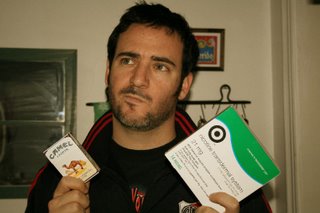What is this, Sophie’s Choice?
 As I weighed the decision this weekend whether to keep smoking or go on the nicotine patch, I wondered: “Is it in my economic interest to quit?”
As I weighed the decision this weekend whether to keep smoking or go on the nicotine patch, I wondered: “Is it in my economic interest to quit?”I know there are plenty of social and health incentives to quit. Smoking will kill me, it stinks up my clothes, and it’s newly banned in DC bars. But is there any economic incentive?
Having recently finished reading Freakonomics, I’ve started questioning the conventional wisdom of nearly everything. The book’s authors revealed that human beings tend to behave less because of social or morality pressures but because of financial incentives.
Yesterday, for instance, while at the Laundromat, I wondered if the facility’s owners had any incentive to cheat customers. By turning down the heat slightly on their dryers -- not too much for anyone to notice but enough to make customers pay extra to dry their clothes -– Laundromat owners theoretically could rake in several thousands of extra dollars per month. And if this were true, would this financial advantage be enough to outweigh the fear of being caught and the ethics involved in cheating loyal customers?
Roosh investigated this principle of incentives yesterday by examining how much each sexual partner was costing him and considering whether an escort service was a more financially desirable choice. He found his $187 CPN (cost per notch) was less than an escort’s rates and, therefore, enough of a difference to be advantageous.
If Roosh could figure out the economics of sex, I could certainly determine whether economics could help me quit smoking.
I spend, on average, $4.50 per pack and smoke about 12 cigarettes per day. With an average cost of 22.5 cents per smoke, I am spending $2.70 per day or $37.80 every two weeks.
The Nicorette 2-week patch package costs $44, about 16% more than the cost of smoking. This is hardly what I would call an economic incentive. Over the course of the six-week program, this would extrapolate to an extra expense of $18.60.
I’d have to spend nearly an extra $20 AND I’d have to suffer through smoking cessation? Not much of a push to cease the habit.
Luckily, everyone’s favorite dual-circled, red-and-white company came to the rescue, this time with a generic alternative.
Target’s Nicotine Transdermal System offered the same two-week package for $28, nearly 26% LESS than my cost of smoking. That’s a savings of almost $30 over six weeks. Good, right?
Maybe. I started to wonder if that thirty bucks was even WORTH the exchange of the pleasure smoking brings me? Perhaps the VALUE of that $30 savings isn’t actually enough to make me quit.
In the end, I bought the Target package and today is my first day on the patch. My wallet may get slightly bulgier in the coming weeks but whether it matters has yet to be seen.
